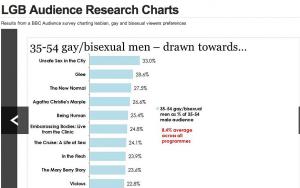
The LGB Audience Research report shows for the first time the percentage of people who watched specific programmes and how much they enjoyed them.
The most popular for young gay and bisexual men, 16 to 34 years old, was ITV’s Vicious with Derek Jacobi and Ian McKellen. The sitcom about two gay men living in Covent Garden was watched by 36.6% of the LGB audience surveyed by the BBC.
Next most popular was Splash! fronted by Tom Daley, followed by theGreat British Bake Off, which has featured openly gay contestants and includes one gay winner from 2012.
Lesbian and bisexual women in the same age group preferred US sitcomRules of Engagement, Never Mind the Buzzcocks and QI. Although Rules of Engagement – a show about couples and their still-single friends – came top for this group, it was only watched by about 14% of the total LGB audience who took part in the survey. It has now been cancelled by American broadcaster CBS after seven seasons, reports Ariel.
In a blog about the research, Adrian Ruth, chair of BBC Pride said the new data was useful.
“Having this scale of data means we can really dig down, letting us look at the differences between gay men and lesbians, and also segment it by age. This is really useful for making meaningful comparisons – for example, young gay men against young straight men – to see what difference being gay makes to consumption.”
The data comes from 1000 people who identified themselves as gay, lesbian or bisexual on the BBC’s Pulse panel, an independent audience reaction group that numbers approximately 20,000.
The BBC updated its 2010 landmark research into the portrayal of lesbian, gay and bisexual people on television, radio and online last year. The new survey of 3500 people found that 50% of LGB audiences believed there was too little television geared towards them and they felt under-represented by all UK broadcasters, not just the BBC.








